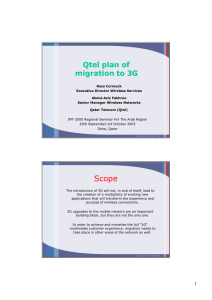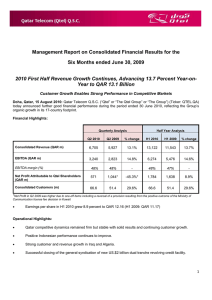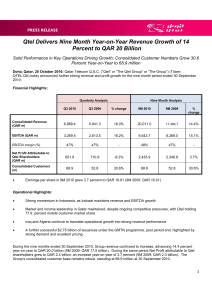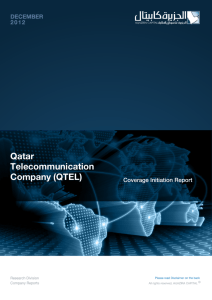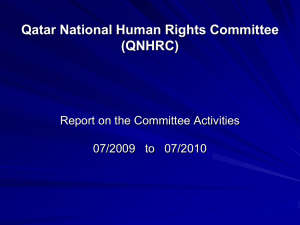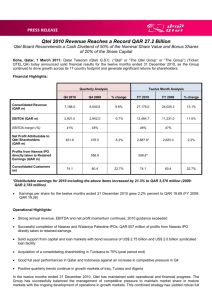Qtel and the environment: going green, step by step Sheikh Abdullah Bin Mohammed
advertisement
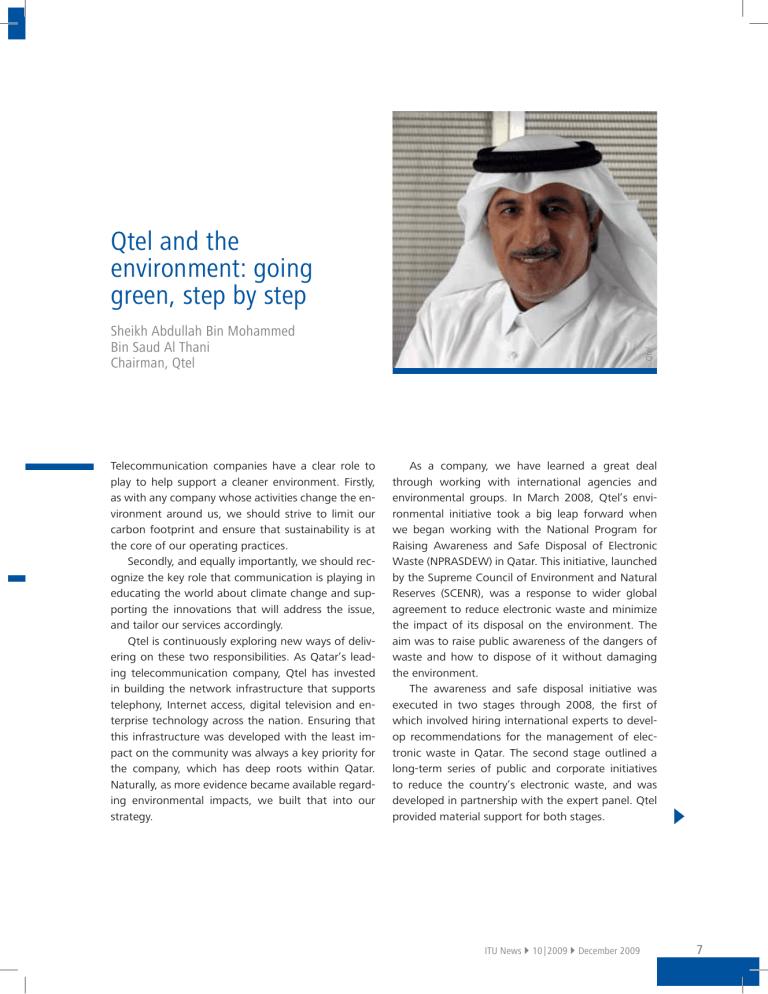
Qtel and the environment: going green, step by step Telecommunication companies have a clear role to play to help support a cleaner environment. Firstly, as with any company whose activities change the environment around us, we should strive to limit our carbon footprint and ensure that sustainability is at the core of our operating practices. Secondly, and equally importantly, we should recognize the key role that communication is playing in educating the world about climate change and supporting the innovations that will address the issue, and tailor our services accordingly. Qtel is continuously exploring new ways of delivering on these two responsibilities. As Qatar’s leading telecommunication company, Qtel has invested in building the network infrastructure that supports telephony, Internet access, digital television and enterprise technology across the nation. Ensuring that this infrastructure was developed with the least impact on the community was always a key priority for the company, which has deep roots within Qatar. Naturally, as more evidence became available regarding environmental impacts, we built that into our strategy. Qtel Sheikh Abdullah Bin Mohammed Bin Saud Al Thani Chairman, Qtel As a company, we have learned a great deal through working with international agencies and environmental groups. In March 2008, Qtel’s environmental initiative took a big leap forward when we began working with the National Program for Raising Awareness and Safe Disposal of Electronic Waste (NPRASDEW) in Qatar. This initiative, launched by the Supreme Council of Environment and Natural Reserves (SCENR), was a response to wider global agreement to reduce electronic waste and minimize the impact of its disposal on the environment. The aim was to raise public awareness of the dangers of waste and how to dispose of it without damaging the environment. The awareness and safe disposal initiative was executed in two stages through 2008, the first of which involved hiring international experts to develop recommendations for the management of electronic waste in Qatar. The second stage outlined a long-term series of public and corporate initiatives to reduce the country’s electronic waste, and was developed in partnership with the expert panel. Qtel provided material support for both stages. ITU News 10 | 2009 December 2009 7 Shutterstock One of the key challenges of this process is working with all actors — State and non-governmental — to create nationwide processes for the disposal of waste material. As an operator, we cannot be held solely responsible for every redundant laptop and mobile phone in Qatar, but we can work with distributors, vendors and municipal authorities to help agree on a shared process, and ensure that all our customers understand it. We have also striven to build environmental priorities into our expansion strategy, to minimize our carbon footprint and reduce the consumption of resources. Qtel was the first operator in the region to sign an agreement with a new market entrant on outdoor site sharing. Under the agreement, Qtel is sharing more than half of its mobile network towers. By sharing sites, both companies are able to provide extensive mobile network coverage, to streamline costs, and, most importantly, reduce the impact on the environment and communities by avoiding the unnecessary duplication of towers across Qatar. Qtel also examined other areas of its operations for ways to reduce the company’s environmental footprint. One issue that emerged was the use of PVC “scratch cards” by prepaid mobile customers to top up their airtime. The cards result in a large 8 ITU News 10 | 2009 December 2009 amount of non-biodegradable waste. In November 2009, Qtel introduced a new series of biodegradable scratch cards for mobile phone customers. Over time, these new cards will replace the millions of PVC scratch cards Qtel sells every year. Inside Qtel as well, there have been opportunities to reduce the use of resources. Despite providing the facilities for an entirely paper-free environment for many corporate customers, we were using more paper than necessary in our own offices. To provide incentive for employees to reduce paper usage, the company launched a monthly contest designed to increase awareness of environmental efforts throughout Qtel Headquarters. In the Conservatree Contest, staff on each floor of the office building try to reduce paper use, and their efforts are evaluated by a volunteer “Green Committee” every month. The floor that most successfully reduces its paper consumption wins a potted pine tree and is known, for that month, as “The Qtel Conservatree Floor.” The Green Committee itself was proposed by employees who shared a concern for the environment and came together to champion the cause. Other environmental actions within Qtel to reduce paper usage include online archiving and workflow processes Qtel and the environment: going green, step by step ever conducted in the country, it was made available to regulatory authorities, medical groups and international research bodies, as well as via our website. A successful strategy for corporate social responsibility, including one for safeguarding the environment, depends upon building support from the ground up. Qtel’s strategy in this respect is identified by the slogan, “For Qatar, Hand in Hand,” with five priorities for engaging with the community: education, health care, environmental issues, social welfare and sport. When it comes to the role of environmental stewardship, the goal at Qtel has been, from the outset, to increase environmental awareness among Qtel employees so that they, in turn, can act as ambassadors carrying this important message to the wider community. These are the small steps we are taking — we believe, working together, we can achieve much for our planet and our people. Shutterstock using Sharepoint and Oracle, with the goal of a paperless workplace. We are also close to launching a paper and plastic recycling programme. Externally, the company is moving towards managing our relationships with customers through paper-free methods as much as possible, by providing online billing, payment via mobile and account management by self-service machines. However, as well as operational responsibilities, telecommunication companies have educational responsibilities. Our employees might not be experts in environmental science, but we can support people who are, and help propagate their findings through our communication services. Qtel supports original research into a number of environmental issues relating to its core business. In 2008, Qatar University’s Electrical Engineering Department, in cooperation with Qtel, published a study of radio-frequency radiation from wireless networks in Qatar. The most comprehensive study ITU IT TU N Ne News ews 1100 | 20 2009 09 D December ecceem mbe ber 20 22009 0099 9
